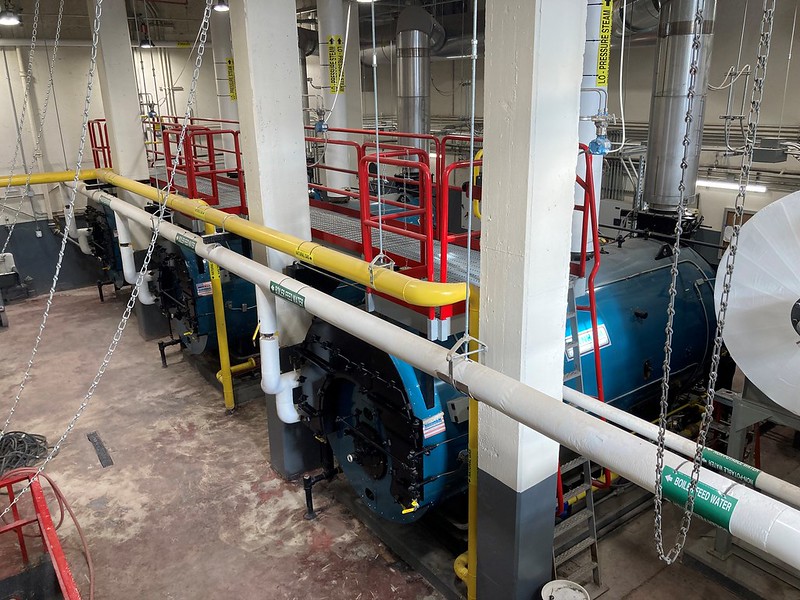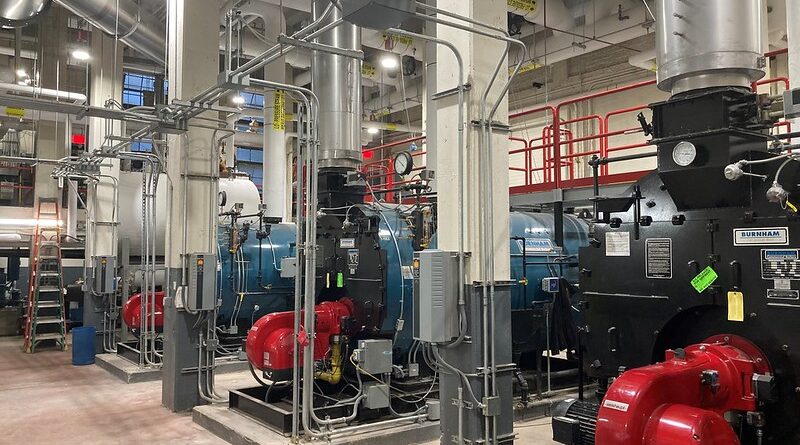New Energy-Efficient Heating System at Berry Houses
On November 20, the New York Power Authority (NYPA) and NYCHA announced the completed installation of energy-efficient heating upgrades at Berry Houses on Staten Island. The project will provide improved heat and hot water service for more than 875 residents across nearly 500 apartments. The project also advances the environmental goals of New York State’s Climate Leadership and Community Protection Act as well as New York City’s Climate Mobilization Act, which both call for greenhouse gas emissions from buildings to be reduced by 40 percent by the year 2030.
“The heating improvements implemented at Berry Houses will ensure the reliable supply of heat and hot water to hundreds of New York public housing residents ahead of the upcoming winter season,” said New York Power Authority Trustee and President and CEO of the Staten Island Economic Corporation Michael Cusick. “In addition to improving quality of life for NYCHA residents, the new heating system will reduce energy and maintenance costs for NYCHA and help shrink its carbon footprint, advancing the State and City’s ambitious climate goals.”
“This administration has prioritized healthy and safe living conditions, as well as more sustainable homes,” said First Deputy Mayor Maria Torres-Springer. “The energy-efficient heating upgrades at Berry Houses meet both of these goals. Especially as we move to the winter months, it’s fundamental that we improve heat and hot water service for public housing tenants. Thank you to NYCHA and NYPA for this important work at Berry Houses.”
“This administration has been committed to bringing NYCHA’s heating systems into the 21st century,” said Executive Director for Housing Leila Bozorg. “NYCHA and NYPA’s partnership delivers on this commitment to supply 875 residents with energy-efficient heating systems that will provide reliability and sustainability to their community and beyond. I applaud NYCHA and NYPA for delivering these upgrades quickly and efficiently to the residents of Berry Houses.”
“It’s very exciting to see the results of NYCHA’s commitment to the delivery of heat and hot water service — a key pillar area of the 2019 HUD Agreement — paired with our sustainability goals,” said NYCHA Chief Executive Officer Lisa Bova-Hiatt. “The heating upgrades made in concert with our partners at NYPA will go a long way to providing residents of Berry Houses with reliable, energy-efficient heat and hot water service, and ultimately, improving the quality of their lives.”
The project replaced the development’s original low-pressure steam boiler plant, which was one of the oldest in New York City, with a newer, more energy-efficient plant to supply reliable heat to more than 500 apartments across eight buildings. Additionally, the development’s hot water system was de-coupled from the central boiler plant and replaced with gas-fired hot water heaters in each building, providing greater reliability and efficiency by decentralizing domestic hot water production. The more than $31 million project, which was announced in August 2022, will reduce annual carbon emissions by more than 800 metric tons — the equivalent of taking nearly 180 cars off the road. The new heat and hot water systems will be monitored by a newly implemented building management system, reporting inefficiencies and outages.
NYCHA and NYPA leveraged the advantages of design-build to streamline the project delivery process. System upgrades at Berry were also bundled with upgrades at Marble Hill Houses and 830 Amsterdam into a single project contract, allowing the design-build contractor to find efficiencies in delivering three separate sites and passing the cost savings to NYCHA. NYCHA used funding from the U.S. Department of Housing and Urban Development’s (HUD) annual federal grant disbursement to NYCHA, as well as State and City grant funds, to finance the construction. The upgrades are a part of NYCHA’s ongoing commitment and work to fulfill the obligations identified in its 2019 Agreement with HUD that mandates quality of life improvements in key areas, including the provision of more reliable and clean heat and hot water for residents.
In addition to the completed energy-efficient project at Berry Houses, NYPA and NYCHA have replaced the current low-pressure steam boiler at Marble Hill Houses in the Bronx with a new, energy-efficient steam boiler system. The $41 million project de-couples the existing hot water systems in 11 residential buildings and installs new gas-fired hot water heaters to improve system reliability and reduce fossil-fuel emissions. At 830 Amsterdam, NYPA and NYCHA are replacing the current steam boiler plant with new electric heat pump technology for both domestic hot water and heating, making this single building fully electrified, removing its dependence on fossil fuels and carbon use.
The energy-efficient upgrades at 830 Amsterdam, Marble Hill, and Berry Houses are among the latest capital projects aimed at reducing the NYCHA’s carbon emissions footprint.
In July 2023, NYPA, NYCHA, and the New York State Energy Research and Development Authority partnered to launch the Induction Stove Challenge, calling on appliance manufacturers to design and produce energy-efficient induction stoves to replace existing gas stoves while avoiding costly electrical upgrades in NYCHA buildings. In November 2023, Governor Hochul announced a request for proposal for the program, which ultimately aims to deploy 10,000 induction stoves in NYCHA apartments. NYPA will execute a contract with the selected manufacturer this quarter.
In December 2021, NYPA, NYCHA, and the New York State Energy Research and Development Authority (NYSERDA) launched the Clean Heat for All Challenge (#CleanHeat4All) to encourage heating and cooling equipment manufacturers to develop a new super-energy-efficient, cold-climate packaged heat pump electrification product that can better serve the needs of existing multifamily buildings and hasten the transition to fossil-free heating sources. Two manufacturers were selected’ they have completed pilots at NYCHA apartments and are currently scaling to full-building pilots.
The 2019 adoption of the Climate Leadership and Community Protection Act (CLCPA) by the New York State legislature and the Climate Mobilization Act by the New York City Council established bold mandates for achieving a clean energy and climate agenda. The CLCPA commits private and public entities to a path of achieving a zero-emission electricity sector by 2040, including 70 percent renewable energy generation by 2030, and to reach economy-wide carbon neutrality. At the local level, the Climate Mobilization Act aims to reduce emissions produced by the city’s largest buildings by 40 percent by 2030 and 80 percent by 2050. The reduction targets for NYCHA are portfolio-wide rather than building-specific, and the Authority works closely with the Department of Buildings, the Mayor’s Office of Sustainability, and other City agencies to meet this ambitious goal.


